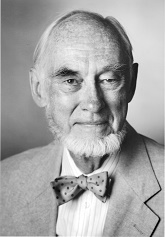
Richard Herr
Professor of History, Emeritus
Blessed with longevity—he celebrated his 100th birthday several weeks before his death in Berkeley, California on May 29, 2022—Dick Herr lived a rich life filled with purpose, achievement and personal and professional reward. He was born on April 7, 1922 in the hills above Guanajuato, Mexico, where his father, Irving Herr, was superintendent of the El Cubo silver mine. The Herrs traced their lineage to the early 18th century Mennonite community of Lancaster, Pennsylvania. The Puritan ancestors of Dick’s mother, Luella Winship, fled to Boston in 1634. Generations of prominent religious, civic and educational leaders contributed their DNA to Irving and Luella Herr’s third son, who honored their memory by composing two detailed family histories: Our Family: The Winships and the Herrs (2010) and After the Gold Rushes Ended: The Story of Irving and Luella (2020), written in collaboration with his daughter Sarah.
After repeated relocations, in 1932, the family moved back to the United States for good, settling in Cincinnati, where Dick spent his adolescence. He entered Harvard College in 1939, where he majored in History. He compressed his senior year to enlist in the army in 1942, where he was assigned to the Signal Intelligence Service. He was among the first American servicemen to enter the concentration camp at Buchenwald shortly after its liberation, and the photographs and letters sent home describing what he witnessed were later turned into materials for talks he gave on his experiences. A far more pleasant result of the time he spent in Paris after the Nazis were driven out was his meeting a young refugee from Franco’s Spain, Elena Fernández Mel, whom he married in 1946. They had two sons, Charles and Winship.
After the war and a year of studying history at the Sorbonne, Dick trained for his graduate degree at the University of Chicago, where he was mentored by the distinguished scholars of the Enlightenment Louis Gottschalk and Robert Palmer. Completed in 1954, his dissertation was turned four years later into his first book, The Eighteenth-Century Revolution in Spain. Soon translated into Spanish—the first of his works to become available to a hispanohablante public—it combined intellectual with religious and political history to provide a detailed overview of a tumultuous period of uneven transition to modernity, which was praised by John Elliot as “the best general account in English of the condition of eighteenth-century Spain.”
Following six years on the faculty at Yale, Dick joined the History Department at the University of California, Berkeley in 1960, where he taught until his retirement in 1991. It was there that he met his second wife, Valerie Shaw, a British-born demographer with whom he had two daughters, Sarah and Jane. Shortly after his arrival in Berkeley, he published a short and lively account of Tocqueville and the Old Regime (1962), which explored the survival of pre-revolutionary structures and practices even in the country where the Revolution had apparently succeeded. It was followed by the major works that cemented Dick’s reputation as one of the most respected students of Iberian history on both sides of the Atlantic: An Historical Essay on Modern Spain (1974) and Rural Change and Royal Finances in Spain at the End of the Old Regime (1989), as well as a number of edited volumes in his field, published both in English and Spanish. In 2016, Dick, well into his nineties, brought out an ambitious synthetic study long in the works on the fraught relationship between individual and community in both Europe and America since the Enlightenment. Separate but Equal? concluded with chapters on the challenges of ethnic migration and women’s rights, which situated them in the ongoing struggle for emancipation he had chartered since his earliest work on the Enlightenment.
Dick had inexhaustible curiosity about many aspects of history. Besides his foundational work on Spain and his strong interest in the history of France, he read and wrote about the United States, Spanish America, political culture after the Enlightenment and women’s history. During his years at Berkeley, Dick helped lead the campus’s program in Spanish and Portuguese Studies, the Iberian Studies Group, and after his retirement, chaired the Portuguese Studies and the Spanish Studies Programs. For years, even after retirement, he taught World History to hundreds of undergraduates. His efforts for the campus earned him the Berkeley Citation when he retired. Among his many other awards were two Guggenheim Foundation Fellowships, The American Historical Association’s Leo Gershoy Award for his contributions to Western European History in the 17th and 18th centuries, and election to both the American Academy of Arts and Sciences and the American Philosophical Society. He served as a visiting professor at the École pratique des Hautes Études, Sixième section, in Paris, the Universidad Internacional Menéndez Pelayo, Santander, Spain and the Universidad de Alcalá de Henares, Spain. The last of these bestowed an honorary doctorate on him in 2001. Other international honors included a corresponding membership in the Real Academia de la Historia in Madrid, a Bronze Medal from the Collège de France, election as Comendador of the Order of Isabel la Católica and Encomienda de Número, Orden del Mérito Civil of Spain.
A sabbatical spent at Clare Hall, Cambridge in 1984-85 led to a life membership in the college. Dick and Valerie spent twenty-five summers in a cottage they built in the nearby village of Girton. During his long retirement Dick remained intellectually alive and physically active. He played a decent game of squash well into his 90’s, and he and Valerie hosted exhibitions of their impressive collection of contemporary Spanish art in their Berkeley home. His admirable ability to write history on both the macro and micro levels was matched by his living a life at once restlessly cosmopolitan and yet rooted in the localities he loved.
Martin Jay
Paula Fass
2022
Photo credit: Margaretta K. Mitchell, 2007
